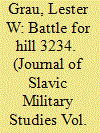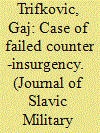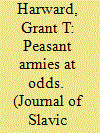| Srl | Item |
| 1 |
ID:
105237


|
|
|
|
|
| Publication |
2011.
|
| Summary/Abstract |
The Battle for Hill 3234 was a small, bitterly-contested mountain fight that was a near-run thing, yet part of one of the most successful operations of the Soviet-Afghan War-Operation Magistral. Indeed, this combat by an under-strength 39-man paratrooper company has gained iconic status in Russian and inspired the popular movie and computer game 9th Company. The movie is great entertainment, but hardly accurate. This is the most-accurate account of this battle in the English language.
|
|
|
|
|
|
|
|
|
|
|
|
|
|
|
|
| 2 |
ID:
105247


|
|
|
|
|
| Publication |
2011.
|
| Summary/Abstract |
This article examines operations "Weiss" and "Schwarz," two of the largest anti-guerrilla sweeps conducted by the German Wehrmacht during the entire Second World War. Four reinforced divisions with ca. 65,000 German soldiers and up to 100 aircraft took part in what is regarded as the most ferocious fighting of the whole war in Yugoslavia. Although conducted with maximum effort in material terms, they were doomed to failure because of the Third Reich's neglect of guerrilla warfare and the resulting lack of a sound counter-insurgency doctrine. Remarkably, operations "Weiss" and "Schwarz" are almost unknown to the public in the West, despite their sheer size. As the founding myths of socialist Yugoslavia, they were extensively written about, almost always from a Partisan perspective. This is the first article to describe the events from the German point of view, and to analyze the Wehrmacht's conduct of these operations in some depth. With the ongoing COIN campaigns in Iraq and Afghanistan, examining the lessons from the past can prove enlightening.
|
|
|
|
|
|
|
|
|
|
|
|
|
|
|
|
| 3 |
ID:
105239


|
|
|
| 4 |
ID:
105244


|
|
|
|
|
| Publication |
2011.
|
| Summary/Abstract |
The battle on the Eastern Front is usually depicted as simply a clash between Nazi Germany and the Soviet Union. However, a multitude of nations joined the Axis on the Eastern Front. Of all these nations, Romania was the most important ally of the Wehrmacht. The depth of Romania's alliance with Nazi Germany has just begun to be explored in the last two decades, but examination of the relationship between the Romanian Army and the Red Army during the war is still almost non-existent. This is particularly troubling when it is taken into account that the Romanian Army eventually fought alongside the Red Army in the last year of the war. This article explores the evolution of Romanian-Soviet interaction from enemies to allies.
|
|
|
|
|
|
|
|
|
|
|
|
|
|
|
|
| 5 |
ID:
105245


|
|
|
|
|
| Publication |
2011.
|
| Summary/Abstract |
This essay explores the process of ethnic cohesion among South Slav nations during and after World War II. The Partisan myth was invented by Josip Bros Tito and his followers as a political instrument to foster ethnic and political cohesion in the Partisan movement against the German occupation of the Balkan nations and in the process of constructing a second Yugoslav republic following the Second World War. Despite the horrors of World War II, it proved to be a useful moment for the CPY to achieve strategic objectives via ethnic unity and under the banner of resistance to the Nazi occupation. Exaggeration and distortion of wartime history was the central strategy of Tito's government in maintaining a national unity in Yugoslavia after World War II.
|
|
|
|
|
|
|
|
|
|
|
|
|
|
|
|
| 6 |
ID:
105235


|
|
|
|
|
| Publication |
2011.
|
| Summary/Abstract |
This article investigates the various conditions, external and internal, that have determined the contemporary conscription policies of Russia, and what conditions must exist should authorities desire to move toward an all-volunteer force. It starts with a brief examination of the historical background behind current Russian conscription policy, and later looks at contemporary Russian attitudes toward service and the institution of the army. Concerns regarding Russian national security posture and fiscal constraints are then addressed. Despite a shift in mentality among Russia's top leaders as to the orientation of their army's posture, real fiscal conditions limit the implementation of many reforms, including a shift to a more contractual and voluntary form of recruitment. Furthermore, the harsh conditions and sometimes criminal climate that populates Russian units serves as a real deterrent to attract qualified soldiers. Not only do current political sensitivities inhibit further reform, but also it is the culture amidst the army itself that needs modernization. For now, any transition to a more contractual and voluntary form of recruitment will depend on more favorable fiscal conditions and political will to transform age old Russian military climate into one founded on basic respect for others.
|
|
|
|
|
|
|
|
|
|
|
|
|
|
|
|
| 7 |
ID:
105242


|
|
|
|
|
| Publication |
2011.
|
| Summary/Abstract |
Two types of strategic cultures developed by Europe and America were the subjects of numerous policy analyses. Divergences in Russian and European views on the world are obvious as well: postmodern Europe contrasts with Russia as a traditional power. Traditionalism of Russian strategic culture is investigated in this article with the help of key official foreign and security policy documents. The author argues that Russia's strategic vision is reminiscent of the American realist model of security culture in which superpower mentality, national interests, sovereignty, and force play a major role.
|
|
|
|
|
|
|
|
|
|
|
|
|
|
|
|
| 8 |
ID:
105241


|
|
|
|
|
| Publication |
2011.
|
| Summary/Abstract |
No political leader lives without espionage. While astute political leaders know well the traps inherent in the mutual deception game of espionage, Stalin's Great Terror of 1937-38 illustrates the extraordinary reach of espionage. In this particular case, Stalin set traps for the world in order to prepare for a forthcoming showdown with his mortal enemies, Germany in particular. He took nearly a million lives of men and women of his own country in the process. Although the Terror still remains an enigma, it appears that Stalin's traps still ensnare people. This offers lessons to be learned about politics in general.
|
|
|
|
|
|
|
|
|
|
|
|
|
|
|
|